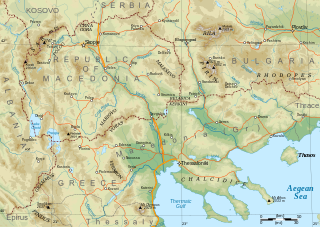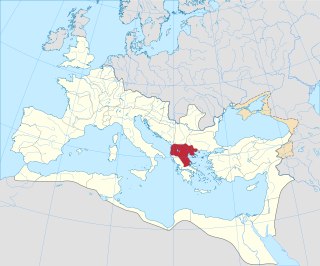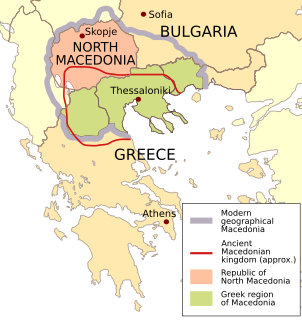
Macedonian is a South Slavic language spoken as a first language by around two million people, principally in North Macedonia and the Macedonian diaspora, with a smaller number of speakers throughout the transnational region of Macedonia. It is the official language of North Macedonia and a recognized minority language in parts of Albania, Romania, and Serbia.

Macedonia is a geographical and historical region of the Balkan Peninsula in Southeast Europe. Its boundaries have changed considerably over time; however, it came to be defined as the modern geographical region by the mid 19th century. Today the region is considered to include parts of six Balkan countries: Greece, North Macedonia, Bulgaria, Albania, Serbia, and Kosovo. It covers approximately 67,000 square kilometres (25,869 sq mi) and has a population of 4.76 million.

Skopje is the capital and largest city of North Macedonia. It is the country's political, cultural, economic, and academic center.

Macedonia, also called Macedon, was an ancient kingdom on the periphery of Archaic and Classical Greece, and later the dominant state of Hellenistic Greece. The kingdom was founded and initially ruled by the royal Argead dynasty, which was followed by the Antipatrid and Antigonid dynasties. Home to the ancient Macedonians, the earliest kingdom was centered on the northeastern part of the Greek peninsula, and bordered by Epirus to the west, Paeonia to the north, Thrace to the east and Thessaly to the south.

The Internal Macedonian Revolutionary Organization – Democratic Party for Macedonian National Unity, simplified as VMRO-DPMNE, is one of the two major parties in North Macedonia, the other being the Social Democratic Union of Macedonia (SDSM).
Macedonians are a nation and a South Slavic ethnic group native to the region of Macedonia. They speak the Macedonian language, a South Slavic language. About two thirds of all ethnic Macedonians live in North Macedonia and there are also communities in a number of other countries.

The Macedonian national football team is the national football team of Macedonia and is controlled by the Football Federation of Macedonia. The team plays its home games at the Toshe Proeski Arena in Skopje.

Macedonia most commonly refers to:

The Socialist Republic of Macedonia was one of the six constituent countries of the Socialist Federal Republic of Yugoslavia, and a socialist nation state of the Macedonians. After the transition of the political system to parliamentary democracy in 1990, the Republic changed its official name to Republic of Macedonia in 1991, and with the beginning of the breakup of Yugoslavia, it declared itself an independent country on 8 September 1991.

The Football Federation of North Macedonia is the governing body of football in North Macedonia based in Skopje. It was founded in 1926.

North Macedonia, formerly presented in the contest as the Former Yugoslav Republic of Macedonia, has participated in the Eurovision Song Contest 18 times since its official debut in 1998. The country had attempted to participate in 1996, but failed to qualify from the audio-only qualifying round. North Macedonia is one of the most unsuccessful countries in the contest, having failed to crack the Top 10 in the 8 appearances it has made it to the final. North Macedonia's best result in the contest is Elena Risteska's 12th-place finish in 2006. North Macedonia has failed to qualify from the semi-final round in ten of the last eleven contests (2008–18), the exception being Kaliopi, who finished 13th in the 2012 final. The current Head of Delegation is Meri Popova.

The Macedonians were an ancient tribe that lived on the alluvial plain around the rivers Haliacmon and lower Axios in the northeastern part of mainland Greece. Essentially an ancient Greek people, they gradually expanded from their homeland along the Haliacmon valley on the northern edge of the Greek world, absorbing or driving out neighbouring non-Greek tribes, primarily Thracian and Illyrian. They spoke Ancient Macedonian, a language closely related to Ancient Greek or a Doric Greek dialect, although the prestige language of the region was at first Attic and then Koine Greek. Their religious beliefs mirrored those of other Greeks, following the main deities of the Greek pantheon, although the Macedonians continued Archaic burial practices that had ceased in other parts of Greece after the 6th century BC. Aside from the monarchy, the core of Macedonian society was its nobility. Similar to the aristocracy of neighboring Thessaly, their wealth was largely built on herding horses and cattle.

The Roman province of Macedonia was officially established in 146 BC, after the Roman general Quintus Caecilius Metellus defeated Andriscus of Macedon, the last self-styled King of the ancient kingdom of Macedonia in 148 BC, and after the four client republics established by Rome in the region were dissolved. The province incorporated ancient Macedonia, with the addition of Epirus, Thessaly, and parts of Illyria, Paeonia and Thrace. This created a much larger administrative area, to which the name of 'Macedonia' was still applied. The Dardanians, to the north of the Paeonians, were not included, because they had supported the Romans in their conquest of Macedonia.

Macedonia is a geographic and administrative region of Greece, in the southern Balkans. Macedonia is the largest and second-most-populous Greek region, with a population of 2.38 million in 2017. The region is highly mountainous, with most major urban centres such as Thessaloniki and Kavala being concentrated on its southern coastline. Together with Thrace, and sometimes also Thessaly and Epirus, it is part of Northern Greece. Greek Macedonia encompasses entirely the southern part of the region of Macedonia, making up 51% of the total area of the region. It also contains Mount Athos, an autonomous monastic region of Greece. Macedonia forms part of Greece's national frontier with three countries: Bulgaria to the north-east, the Republic of North Macedonia to the north, and Albania to the north-west.

Macedonian nationalism is a general grouping of nationalist ideas and concepts among ethnic Macedonians that were first formed in the late 19th century among separatists seeking the autonomy of the region of Macedonia from the Ottoman Empire. The idea evolved during the early 20th century alongside the first expressions of ethnic nationalism among the Slavs of Macedonia. The separate Macedonian nation gained recognition after World War II when the "Socialist Republic of Macedonia" was created as part of Yugoslavia. Afterwards the Macedonian historiography has established historical links between the ethnic Macedonians and events and figures from the Middle Ages up to the 20th century. Following the independence of the Republic of Macedonia in the late 20th century, issues of Macedonian national identity have become contested by the country's neighbours, as some adherents to aggressive Macedonian nationalism, called Macedonism, hold more extreme beliefs such as an unbroken continuity between ancient Macedonians, and modern ethnic Macedonians, and views connected to the irredentist concept of a United Macedonia, which involves territorial claims on a large portion of Greece, along with smaller regions of Albania, Bulgaria, and Serbia.

The use of the name "Macedonia" was disputed between the Southeast European countries of Greece and North Macedonia. Pertinent to its background is an early 20th-century multifaceted dispute and armed conflict that formed part of the background to the Balkan Wars. The specific naming dispute, although an existing issue in Yugoslav–Greek relations since World War II, was reignited after the breakup of Yugoslavia and the newly gained independence of the former Socialist Republic of Macedonia in 1991. Since then, it was an ongoing issue in bilateral and international relations until it was settled with the Prespa agreement in June 2018, the subsequent ratification by the Macedonian and Greek parliaments in late 2018 and early 2019, and the official renaming of Macedonia to North Macedonia in February 2019.
The Macedonian First League is the top-tier basketball competition in the Republic of North Macedonia. Prior to Macedonian independence in 1991, before that Macedonian teams competed in Macedonian Republic League and Macedonian top basketball teams competed in the Yugoslav First Federal Basketball League, organized by the Basketball Federation of Yugoslavia. Macedonian First league was made on the base of the Macedonian Republic League, and teams from the higher level federal Leagues joined the newly made and renamed League competition that become the First League.
Slavic-speakers are a linguistic minority population in the northern Greek region of Macedonia, who are mostly concentrated in certain parts of the peripheries of West and Central Macedonia, adjacent to the territory of the Republic of North Macedonia. The language called "Slavic" in the context of Greece is generally called "Macedonian" or "Macedonian Slavic" otherwise. Some members have formed their own emigrant communities in neighbouring countries, as well as further abroad.

North Macedonia, officially the Republic of North Macedonia, is a country in the Balkan Peninsula in Southeast Europe. It is one of the successor states of the former Yugoslavia, from which it declared independence in September 1991 under the name Republic of Macedonia.

The Argead dynasty was an ancient Macedonian royal house of Dorian Greek provenance. They were the founders and the ruling dynasty of the kingdom of Macedon from about 700 to 310 BC.












